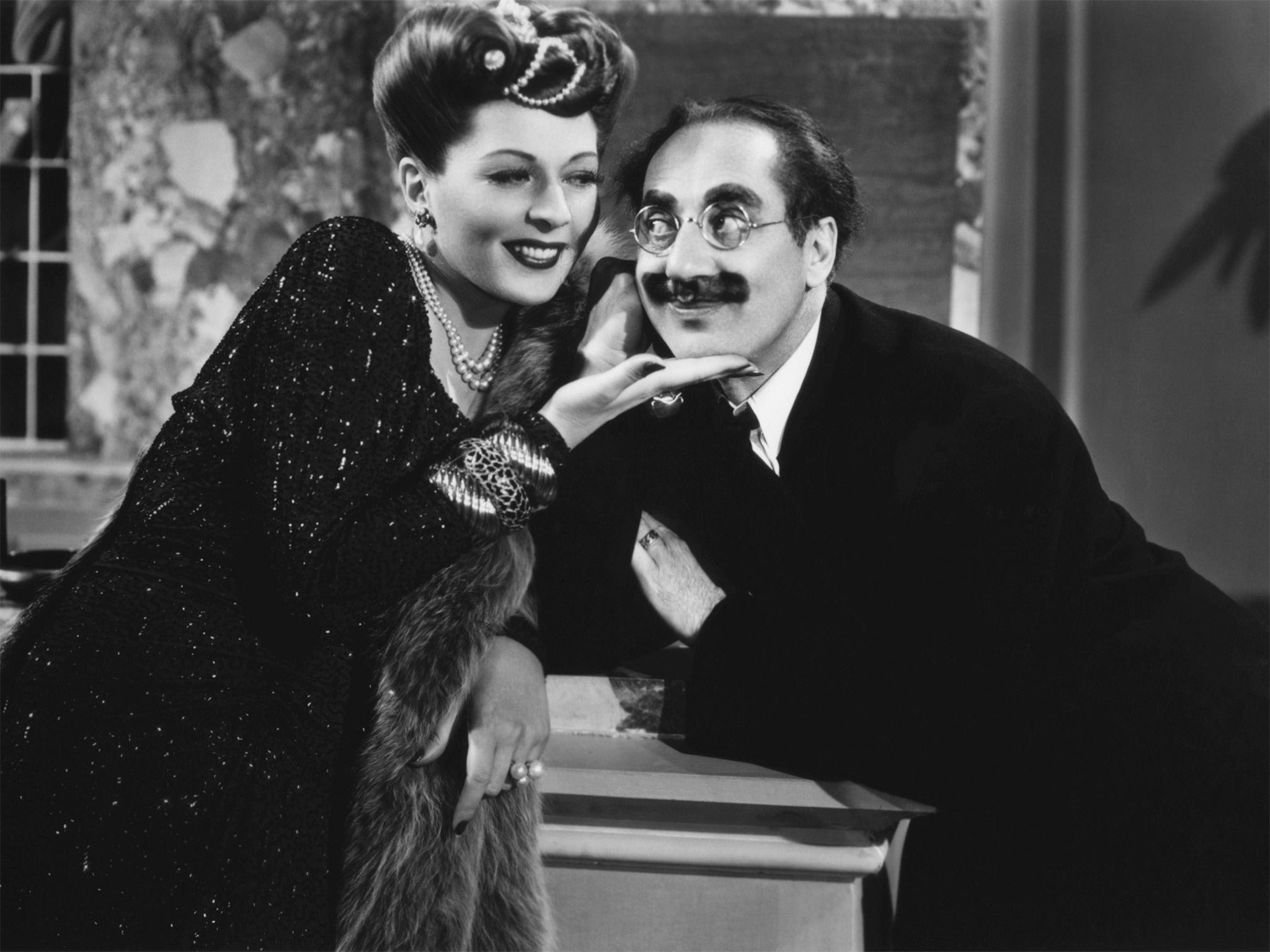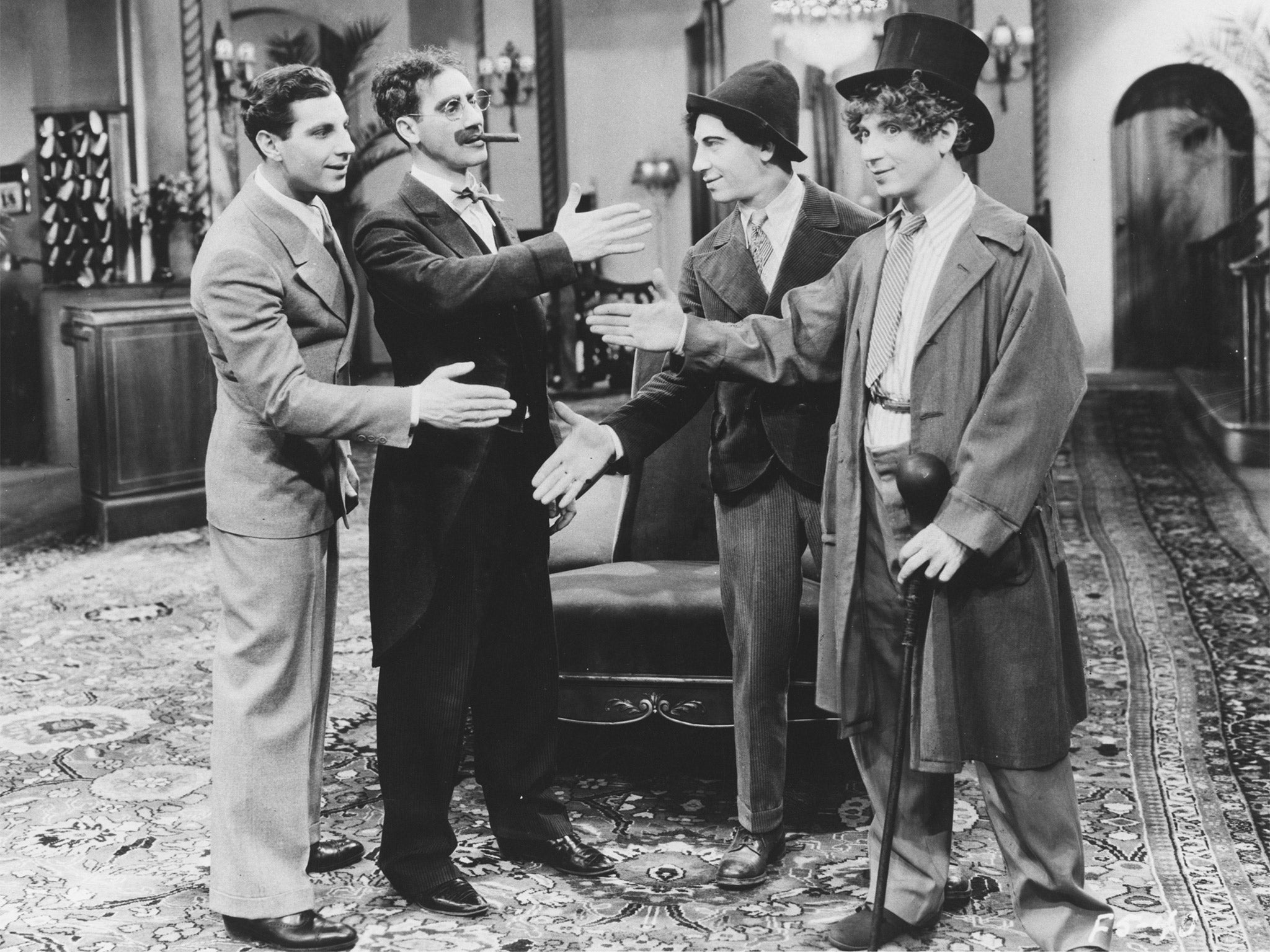BFI launches special Marx Brothers season
Lifelong fan Sean O'Grady says that Groucho and his anarchic siblings can still teach today's movie comics some lessons

Your support helps us to tell the story
From reproductive rights to climate change to Big Tech, The Independent is on the ground when the story is developing. Whether it's investigating the financials of Elon Musk's pro-Trump PAC or producing our latest documentary, 'The A Word', which shines a light on the American women fighting for reproductive rights, we know how important it is to parse out the facts from the messaging.
At such a critical moment in US history, we need reporters on the ground. Your donation allows us to keep sending journalists to speak to both sides of the story.
The Independent is trusted by Americans across the entire political spectrum. And unlike many other quality news outlets, we choose not to lock Americans out of our reporting and analysis with paywalls. We believe quality journalism should be available to everyone, paid for by those who can afford it.
Your support makes all the difference.Why bother with some 80-year-old (at least) jokes? Well, allow me to help you understand why it is worth going to see the Marx Brothers' best movies, in proper screenings, at the special BFI season on London's South Bank.
This, for example, is surely one of the best of Groucho Marx's many memorable exchanges with the stately woman, Margaret Dumont (referred to by Groucho when he picked up a belated Academy award in 1974 as "practically the fifth Marx Brother"). It is from Duck Soup (1933). Groucho is the charlatan Rufus T Firefly, invited by the wealthy Mrs Teasdale (Dumont), inexplicably, to become prime minister of Freedonia:
"Rufus T Firefly: Not that I care, but where is your husband?
Mrs Teasdale: Why, he's dead.
Rufus T Firefly: I'll bet he's just using that as an excuse.
Mrs Teasdale: I was with him to the very end.
Rufus T Firefly: Hmmm. No wonder he passed away.
Mrs. Teasdale: I held him in my arms and kissed him.
Rufus T Firefly: Oh, I see – then, it was murder. Will you marry me? Did he leave you any money? Answer the second question first.
Mrs Teasdale: He left me his entire fortune.
Rufus T Firefly: Is that so? Can't you see what I'm trying to tell you? I love you! [jumps into her arms]
Mrs Teasdale: Oh, your Excellency!
Rufus T Firefly: You're not so bad yourself."
There are very few people alive who will have seen the Marxes first time around in the cinemas, let alone their vaudeville shows. In the 1950s and 1960s they were still appearing on TV – Groucho especially, whose quiz shows were based on him insulting the guests, one of so many Marxian comic innovations we take for granted – and their movies were often on the small screen. In the 1970s they were a late-night treat on the BBC over the Christmas holidays, and, as you can tell, I got hooked. Lots of comics would take off Groucho. Woody Allen and others would perform homages in their films, and every joke shop had its stock of plastic Groucho nose, eyebrows and moustaches. But the Marxes, sons of Jewish immigrants, the father a tailor, the mother in showbusiness, seem best remembered for that quip of Groucho's about not wanting to be a member of any club that would have him as a member.
That's not good enough. They virtually invented the cinematic sight gag, for a start, at least in its most literal form, usually with some prop extracted from the voluminous pockets of Harpo's coat; such as a candle burning at both ends (still can't work out how they did that).

They also have a claim to having been first with cine-satire, mild as it had to be in a Hollywood governed by moralistic codes that restrained much earthier humour. The brothers' best pictures, the ones with some edge and little plot, were the early ones for Paramount, often based on their stage act. This latter, by the way, was, by all accounts, a fairly conventional vaudeville "variety" affair, based on the Marxes' genuine musical and choral talents; they were originally billed as the Three Nightingales. As such, they were not successful – until they bombed one night and decided to, yes, insult the audience and experiment with more and more surreal antics to wake up a jaded theatre. It worked.
Of the movies, by common consent, the finest is Duck Soup, which enjoyed a revival in the 1960s among the Vietnam generation as an anti-war piece. It is a mere 68 minutes long, and tellingly it does without the usual long musical interludes from Chico and Harpo. In the film, Freedonia is attacked by Sylvania. It is all very Ruritanian, yet even in our own time Europe is full of quarrels in faraway countries between people of whom we know nothing, from Bosnia-Herzegovina to Transdniestria. In fact, so strong was this Duck Soup – in 1933 Hitler had just come to power – that Mussolini banned the film, with much the same aggrieved dignity as North Korea's Kim Jong-Un has displayed over The Interview. As with movies so with cartoons, one might add. But Duck Soup was also not greatly to the taste of contemporary, isolationist America; it was a box-office flop that ended their careers at Paramount.
By contrast, The Cocoanuts, the first fruit of the Paramount deal, in 1929, was a commercial success, though also a satire, this time on the great Florida land boom of the day. Again, see the echo with our own time. Then as now America was struggling to recover from the implosion of a real-estate bubble and a stock market crash. The Cocoanuts is much more of a "musical", has poor sound quality, and was made on a clearly modest budget . The camera- work is static; the noisy cameras had to be covered to muffle their noise, and hence couldn't move easily. Still, talk Groucho certainly did, as much as Harpo did not, and pointedly: "You can have any kind of a home you want. You can even get stucco. Oh, how you can get stuck-o".

Watch Apple TV+ free for 7 days
New subscribers only. £8.99/mo. after free trial. Plan auto-renews until cancelled

Watch Apple TV+ free for 7 days
New subscribers only. £8.99/mo. after free trial. Plan auto-renews until cancelled
The second Paramount film, Animal Crackers, came in 1930, and was also based on their stage act. Groucho, as a big-game hunter, now explores even more outrageous word games and punnery, plus a little ad-libbing: "One morning I shot an elephant in my pyjamas. How he got in my pyjamas, I don't know." Inventively, Groucho adds references to the stock prices of various busted shares of the time (on which he had lost a fortune), with, echoes of a contemporary Eugene O'Neill play, Strange Interlude. An audacious breach of the "fourth wall" sees Groucho deliver his soliloquy – quite a shock in the first years of sound;
"Living with your folks. Living with your folks. The beginning of the end. Drab dead yesterdays shutting out beautiful tomorrows. Hideous, stumbling footsteps creaking along the misty corridors of time. And in those corridors I see figures, strange figures, weird figures: Steel 186, Anaconda 74, American Can 138..." Or, "Don't forget that the stockholder of yesteryear is the stowaway of today", as he put it in Monkey Business, another Paramount picture, fatally compromised by the absence of Dumont.

So the four, at the time, Marx Brothers settled into their roles at Paramount, and in a way they played themselves. Chico was the cod-Italian buffoon and wannabe fraudster. He played the piano and chased girls, and gambled, much as he did in real life. He was originally named Chicko by his siblings because he chased the chicks so much. "Chico" was a printer's typo, and it stuck.
Harpo also chased girls and played the harp, (and a clarinet solo in The Cocoanuts). Harpo, by the way, could speak perfectly well, in a fine baritone. He never spoke again in public after one critic said of a stage show that it might have been better if Harpo hadn't said anything. Zeppo played cheesy romantic leads, and left after the Paramount years, becoming an agent, as did Gummo, who never appeared on film (except for a 1921 short, Humor Risk, believed lost). All the brothers looked so alike that they could impersonate each other – brought to great effect in the famous "mirror scene", where Harpo and Chico, made up like Groucho, are indistinguishable to Groucho, and the audience, as they mimic each other's reflections. The idea was invented by Chaplin, but perfected by the Marxes.
After Duck Soup, MGM took them on. The new studio offered bigger budgets and grander musical numbers. Most of their inventiveness survived the transition, and they starred in two productions that stand up well now – A Day at the Races and A Night at the Opera. And yet two things went wrong. First, one of their closest and most brilliant collaborators, Irving Thalberg, died, and, second, Groucho did not get on with Louis B Mayer. As a result they were a little creatively neglected and the (relative) weakness of The Big Store, At the Circus and Go West in 1939 to 1941 shows that money isn't everything. By then, too, they were no longer working with other freewheeling writers and producers such as George Kaufman and Morrie Ryskind. The one picture they did with RKO, Room Service, like The Cocoanuts a sort of proto-Fawlty Towers hotel farce, wasn't even written for them.
Which leaves their final effort, Love Happy (1949), produced with the sole purpose of clearing Chico's gambling debts. Not being shown by the BFI, it is a sad sort of goodbye, because it plainly ran out of dough, and much else, before it was finished, and they might have otherwise made more of one of the first celluloid appearances by Marilyn Monroe. Like Dumont, she too could have become another Marx Brother. Anyway, the South Bank beckons. As Groucho once said, "Hello, I must be going."
The Marx Brothers season, BFI Southbank, London SE1 (bfi.org.uk/southbank) to 31 January
Join our commenting forum
Join thought-provoking conversations, follow other Independent readers and see their replies
Comments